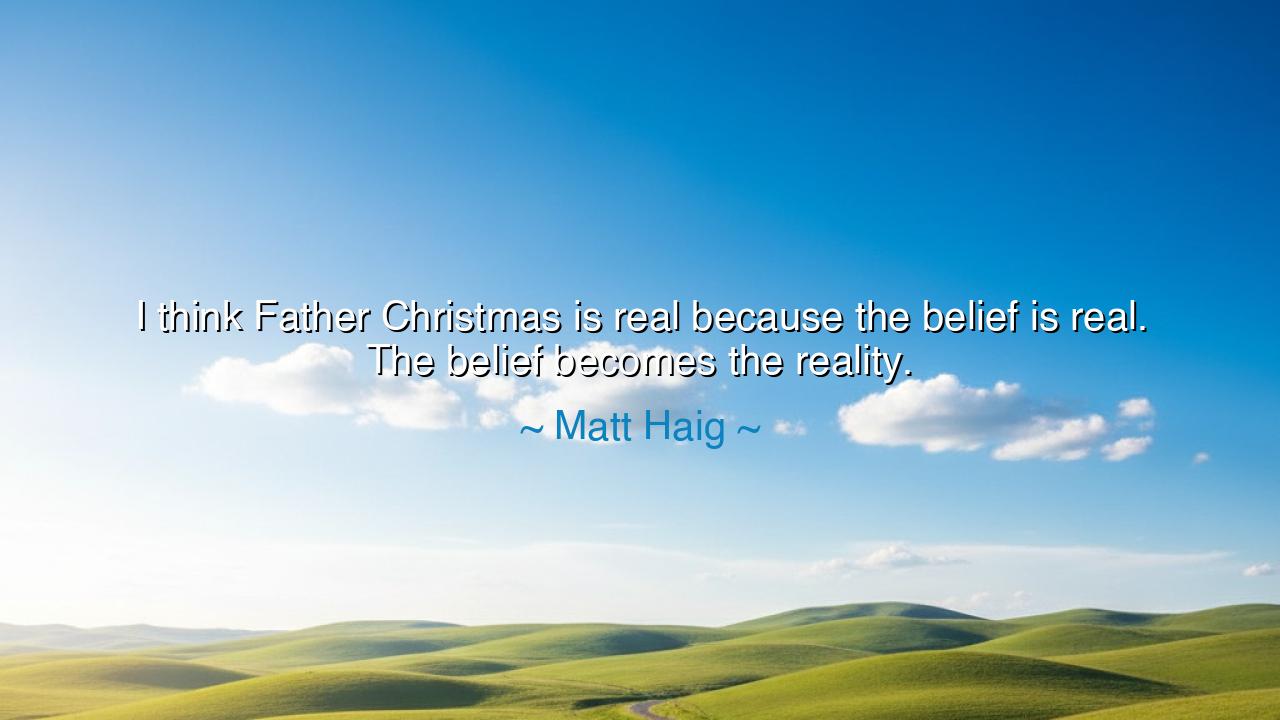
I think Father Christmas is real because the belief is real. The
I think Father Christmas is real because the belief is real. The belief becomes the reality.






Opening Scene – Narrated by Host
The room was quiet, with only the soft crackling of a nearby fire filling the space. Jack sat in an armchair, a book in his lap, but his thoughts were elsewhere. He had just come across a quote that resonated deeply with him, a reflection on belief, reality, and how the things we believe in shape our experiences.
Jeeny entered the room, noticing Jack’s thoughtful expression. She set down a cup of tea on the table beside him and took a seat across from him.
Jeeny: “You seem deep in thought. What’s on your mind?”
Jack looked up, still smiling faintly, and showed her the quote.
Jack: “I was thinking about something Matt Haig said: ‘I think Father Christmas is real because the belief is real. The belief becomes the reality.’ It’s such a beautiful way to look at belief and how it shapes our reality. It’s not just about the literal existence of something—it’s about the power that belief has in creating our experience of the world.”
Jeeny leaned back, considering his words.
Jeeny: “That’s such an interesting perspective. It’s true, though. Belief is such a powerful force. The things we believe in, whether it’s something like Father Christmas or something more abstract, can completely change how we experience the world. When you believe in something, it becomes real to you, in your experience, even if it’s not a tangible reality.”
Jack: “Exactly. It’s like the idea that our beliefs create the lens through which we see the world. If we believe in magic or kindness or joy, that belief shapes how we perceive things. It’s not about whether something exists in a literal sense—it’s about how it influences our lives when we choose to believe in it.”
Host: The conversation deepened as Jack and Jeeny reflected on the power of belief and its ability to shape reality. Haig’s quote wasn’t just about Santa Claus—it was about how our beliefs, even in the intangible or fantastical, influence the way we experience life. Belief wasn’t just a mental construct; it was a force that could transform our perception and experience of the world.
Jeeny: “I think it also speaks to the idea that belief isn’t always about objective truth—it’s about the subjective experience of believing. The things we hold dear, the things we choose to believe in, can give us comfort, hope, and meaning. And those beliefs can shape the world around us, even if others don’t share them.”
Jack: “Exactly. And sometimes, it’s the belief in something larger than ourselves—whether it’s a holiday tradition, a sense of wonder, or the idea of community—that gives us a sense of purpose or direction. Those beliefs create a shared reality, one that makes life richer, more meaningful.”
Jeeny: “It’s like the power of imagination. When we believe in something, even something whimsical or fantastical, it changes the way we move through the world. We begin to see possibilities, joy, and magic in places we might otherwise overlook. Belief gives us permission to dream, to experience life in a way that feels full of wonder.”
Host: Jack smiled, feeling the weight of their conversation settle in. Haig’s words weren’t just about belief in Santa Claus—they were about the transformative power of belief itself. What we choose to believe in shapes the way we live, the way we engage with the world, and the experiences we have. Belief wasn’t just about truth—it was about the reality we created for ourselves.
Jack: “So, maybe the takeaway here is that belief is more than just a thought—it’s a way of living. What we choose to believe in shapes our experiences, our interactions, and even our sense of purpose. It’s not about whether something is true in the objective sense—it’s about the reality it creates for us.”
Jeeny: “Exactly. And maybe that’s why belief is so powerful. It’s not just about having faith in something external—it’s about what belief does for us internally. It creates meaning, connection, and a sense of wonder in our lives, and that makes it real in the most important way.”
Climax and Reconciliation
The room felt warmer now, as Jack and Jeeny reflected on the deeper meaning behind Haig’s words. Outside, the world continued its steady rhythm, but inside, they had uncovered something important: belief was a force that shaped not only how we saw the world, but also how we experienced it. Whether it was something as magical as Father Christmas or as personal as a dream, belief had the power to create a reality that was uniquely our own.
Jack: “So, maybe the key is to embrace belief as a way to enrich our lives, to create a reality that is full of meaning and wonder. The belief itself is what makes things real to us.”
Jeeny: “Exactly. And when we believe in something, we open ourselves up to experiences that wouldn’t exist without that belief. It’s a reminder that belief isn’t just about what’s real—it’s about what makes life feel real to us.”
Host: The conversation settled into a quiet understanding. Belief wasn’t about objective truths—it was about the power it had to shape our reality, to create meaning and wonder in our lives. What we chose to believe in made all the difference, and in that belief, we created the reality we experienced.






AAdministratorAdministrator
Welcome, honored guests. Please leave a comment, we will respond soon